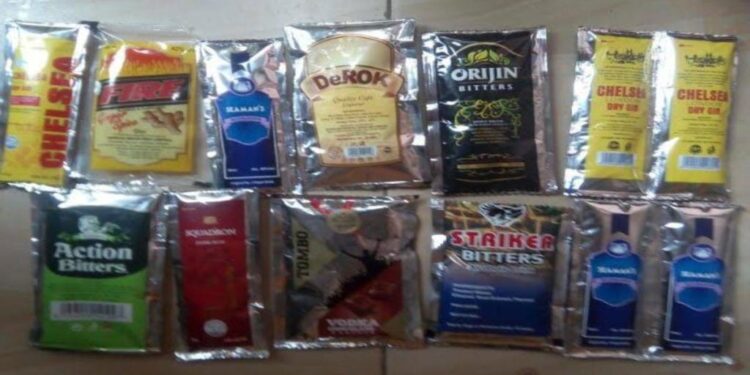
Members of the Distillers and Blenders Association of Nigeria on Tuesday stormed the premises of the National Agency for Foods and Drugs Administration and Control in Oshodi, Lagos State to protest the ban on sachet and PET bottles alcohol drinks.
Also, in a joint statement on Tuesday, the Food Beverage and Tobacco Senior Staff Association and the National Union of Food Beverages and Tobacco Employees, said, “This singular action (the ban) has sent over 500,000 breadwinners out of jobs and into the oversaturated Nigerian labour market.”
The associations lamented that the new policy would further pile more problems on the Nigerian economy as it may lead to the eventual shutdown of the industries producing these products.
The protest by the distillers followed the announcement by the Director General of NAFDAC, Prof Mojisola Adeyeye, on Monday that the agency would begin the enforcement of the ban on the importation, manufacture, distribution, sale, and use of alcoholic beverages in sachets, PET, and glass bottles of 200ml and below.
The agency had in January 2022 announced a stop to the registration of alcohol in sachet and small-volume PET and glass bottles.
Adeyeye, who dropped the hint in Abuja, said, “Registration of new alcoholic drinks in sachet and small volume PET and glass bottles above 30 per cent ABV (alcohol by volume) has been banned by NAFDAC following the recommendation of a high-powered Committee of the Federal Ministry of Health and NAFDAC on one hand, the Federal Competition and Consumer Protection Commission and Industry represented by the Association of Food, Beverages and Tobacco Employers; and the Distillers and Blenders Association of Nigeria in December 2018.”
On Tuesday, distillers, in their large numbers, protested at the NAFDAC office in Lagos.
Speaking with newsmen, the Vice Chairman of the Lagos Chapter of Trade Union Congress, Idogen Emmanuel, said since the commencement of the ban and seal of companies producing alcoholic beverages in sachets and PET bottles, many of its members had been forced to sit at home which may result in job loss.
Emmanuel Said, “Last Thursday, NAFDAC moved to go and seal up all our companies producing sachet drinks, forgetting that the economy is so tense and harsh and they want to throw millions of persons back into the labour market. The excuse of NAFDAC is that small children consume these sachet drinks but it is boldly written on all our sachet drinks that it is meant for persons aged 18 and above.
“We are battling with the hardship of the fuel subsidy removal and dollar floating as manufacturers and now the government just decided to seal up companies because they said small children are consuming it (alcohol). It is an aberration.
“We are appealing to NAFDAC to reopen these companies so that we can come to a round table and look for a way forward. If they feel that we are not doing enough to sensitise the public, retailers and wholesalers on the need for them not to sell to children, we are ready to do more but it is wrong to close the companies at this time that the economy of the nation is unstable.”
Meanwhile, the News Agency of Nigeria reports that NAFDAC officials, on Tuesday, began enforcement of the ban on sachets of alcoholic drinks in Osun State.
The NAFDAC officials visited some of the factories where the alcoholic beverages were being produced in sachets, pets and glass bottles of 100ml and below in Osogbo, Ilesa and Ile-Ife.
Speaking during the enforcement operation, the Assistant Director, NAFDAC Investigation and Enforcement Directorate, Mr Dare Moses, said, “This enforcement is a nationwide thing and that is why we are here in Osun to sensitise the companies producing this sachet alcoholic bitter.
“The deadline had been given for producers of alcoholic beverages to phase out 100ml and those in sachets and the rest so that we reduce the menace of abuse of alcohol by the youth and the general public.
“NAFDAC has stopped the registration for the manufacturing of alcoholic bitter drink that is below 200ml; this is due to the abuse of the drink by Nigerians.
“Due to its small size and affordability, even primary school pupils buy it to drink, and this is affecting their mental well-being.”


















































